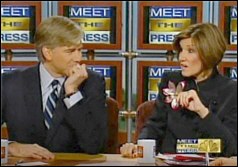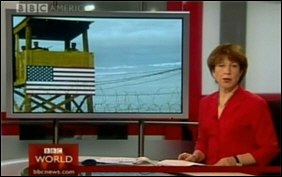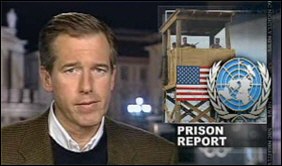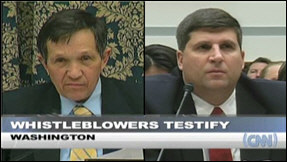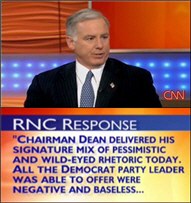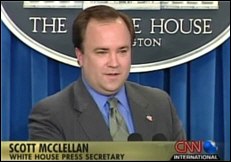Guest blogged by David Edwards of Veredictum.com


Video in Streaming Flash format...
Video in Windows Media format...
Audio in MP3 format...
Thanks to a heads-up from Larisa at The Raw Story, we were able to captured this broadcast of CNBC's Tim Russert show. Russert interviewed James Risen and Robert O'Harrow, Jr. The video contains about 24 minutes of clips from CNBC's Saturday broadcast.
James Risen broke the NSA warrantless domestic spying story for the New York Times. He also has a new book out, State of War: The Secret History of the CIA And The Bush Administration. Risen is known to have sources within various intelligence agencies and has recieved information from several NSA whistleblowers. One of those whistleblowers, Russell Tice, recently testified before congress that NSA domestic surveillance programs may be much more widespread than the "limited" program that the Bush Administration has admitted. Tice has said that some programs could be monitoring "millions of Americans".
Robert O'Harrow, Jr. is an award-winning reporter for the Washingon Post with an expertise data mining and privacy issues. His recent book, No Place to Hide: Behind the Scenes of Our Emerging Surveillance Society, describes "a surveillance society that's less centralized and more a joint public/private venture".
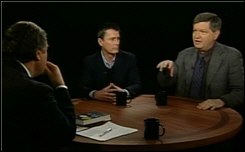 Together, Risen and O'Harrow paint a picture of an enormous partnership between U.S. intelligence agencies and private data collection firms. Spying agencies like the NSA can leverage its' massive computing power to mine data collected by these private firms. The result is a mind-boggling domestic surveillance capability with access to nearly any information imaginable. Phone calls, email, video as well as financial, criminal and other personal records can all be searched at the same time. The NSA's powerful computers can mine the data to find otherwise imperceptible links for profiling groups and individuals.
Together, Risen and O'Harrow paint a picture of an enormous partnership between U.S. intelligence agencies and private data collection firms. Spying agencies like the NSA can leverage its' massive computing power to mine data collected by these private firms. The result is a mind-boggling domestic surveillance capability with access to nearly any information imaginable. Phone calls, email, video as well as financial, criminal and other personal records can all be searched at the same time. The NSA's powerful computers can mine the data to find otherwise imperceptible links for profiling groups and individuals.
Russert calls it a "sobering" discussion. The interview only scratches the surface of how extensive the scope of Big Brother's monitoring of Americans may be. The surveillance programs are a dramatic departure from what the public has come to believe. It's easy to see why the Bush Administration has avoided legislation and oversight.
It's quite possible that the American people would not stand for Bush's spying policies if they had a sense of the true nature of the government's surveillance.
UPDATE 5/8/06: Luke has now posted a text transcript of this Russert/Risen/O'Harrow interview.




 Blowing Smoke.
Blowing Smoke. 'Green News Report' 5/6/25
'Green News Report' 5/6/25
 SCOTUS Allowing Publicly-Funded Religious Schools 'Would be a Ground-Breaking Disaster': 'BradCast' 5/7/25
SCOTUS Allowing Publicly-Funded Religious Schools 'Would be a Ground-Breaking Disaster': 'BradCast' 5/7/25 Trump Judge Blocks NC GOP Attempt to Steal 2024 State Supreme Court Election: 'BradCast' 5/6/25
Trump Judge Blocks NC GOP Attempt to Steal 2024 State Supreme Court Election: 'BradCast' 5/6/25 Prosecutors Resign After Trump U.S. Attny Strikes Deal With Felon Cop: 'BradCast' 5/5/25
Prosecutors Resign After Trump U.S. Attny Strikes Deal With Felon Cop: 'BradCast' 5/5/25 Sunday 'Good Buy, Dolly!' Toons
Sunday 'Good Buy, Dolly!' Toons Trump Losing Streak Continues into SECOND Hundred Days: 'BradCast' 5/1/25
Trump Losing Streak Continues into SECOND Hundred Days: 'BradCast' 5/1/25 'Green News Report' 5/1/25
'Green News Report' 5/1/25 100 Daze: 'BradCast' 4/30/25
100 Daze: 'BradCast' 4/30/25 Campaign to 'Impeach Trump Again' Gains Fresh Momentum: 'BradCast' 4/29/25
Campaign to 'Impeach Trump Again' Gains Fresh Momentum: 'BradCast' 4/29/25 'Green News Report' 4/29/25
'Green News Report' 4/29/25 And Then They Came for the Judges...: 'BradCast' 4/28/25
And Then They Came for the Judges...: 'BradCast' 4/28/25 Sunday 'Desperation' Toons
Sunday 'Desperation' Toons Trump EPA Guts Enviro Justice Office: 'BradCast' 4/24/25
Trump EPA Guts Enviro Justice Office: 'BradCast' 4/24/25 'Green News Report' 4/24/25
'Green News Report' 4/24/25 Sunday
Sunday  Largest U.S. Broad-caster Hoaxes Viewers to Help Gut FCC Rules: 'BradCast' 4/23/25
Largest U.S. Broad-caster Hoaxes Viewers to Help Gut FCC Rules: 'BradCast' 4/23/25 FCC on Precipice of Ending All Limits on Corp. Control of Local TV Stations
FCC on Precipice of Ending All Limits on Corp. Control of Local TV Stations GOP Earth Day 2025 Hypocrisies and Dilemmas: 'BradCast' 4/22/25
GOP Earth Day 2025 Hypocrisies and Dilemmas: 'BradCast' 4/22/25 Pope Francis Dies, Trump Still Alive and Criming: 'BradCast' 4/21/25
Pope Francis Dies, Trump Still Alive and Criming: 'BradCast' 4/21/25 Soc. Sec. Expert Warns DOGE of Collapse, Privatization: 'BradCast' 4/10/2025
Soc. Sec. Expert Warns DOGE of Collapse, Privatization: 'BradCast' 4/10/2025 Trump Blinks, Chaos Reigns, Markets Spike Amid Tariff 'Pause': 'BradCast' 4/9/25
Trump Blinks, Chaos Reigns, Markets Spike Amid Tariff 'Pause': 'BradCast' 4/9/25 SCOTUS Deportation Ruling Grimmer Than First Appears: 'BradCast' 4/8/25
SCOTUS Deportation Ruling Grimmer Than First Appears: 'BradCast' 4/8/25 Cliff Diving with Donald: 'BradCast' 4/7/25
Cliff Diving with Donald: 'BradCast' 4/7/25
 VA GOP VOTER REG FRAUDSTER OFF HOOK
VA GOP VOTER REG FRAUDSTER OFF HOOK Criminal GOP Voter Registration Fraud Probe Expanding in VA
Criminal GOP Voter Registration Fraud Probe Expanding in VA DOJ PROBE SOUGHT AFTER VA ARREST
DOJ PROBE SOUGHT AFTER VA ARREST Arrest in VA: GOP Voter Reg Scandal Widens
Arrest in VA: GOP Voter Reg Scandal Widens ALL TOGETHER: ROVE, SPROUL, KOCHS, RNC
ALL TOGETHER: ROVE, SPROUL, KOCHS, RNC LATimes: RNC's 'Fired' Sproul Working for Repubs in 'as Many as 30 States'
LATimes: RNC's 'Fired' Sproul Working for Repubs in 'as Many as 30 States' 'Fired' Sproul Group 'Cloned', Still Working for Republicans in At Least 10 States
'Fired' Sproul Group 'Cloned', Still Working for Republicans in At Least 10 States FINALLY: FOX ON GOP REG FRAUD SCANDAL
FINALLY: FOX ON GOP REG FRAUD SCANDAL COLORADO FOLLOWS FLORIDA WITH GOP CRIMINAL INVESTIGATION
COLORADO FOLLOWS FLORIDA WITH GOP CRIMINAL INVESTIGATION CRIMINAL PROBE LAUNCHED INTO GOP VOTER REGISTRATION FRAUD SCANDAL IN FL
CRIMINAL PROBE LAUNCHED INTO GOP VOTER REGISTRATION FRAUD SCANDAL IN FL Brad Breaks PA Photo ID & GOP Registration Fraud Scandal News on Hartmann TV
Brad Breaks PA Photo ID & GOP Registration Fraud Scandal News on Hartmann TV  CAUGHT ON TAPE: COORDINATED NATIONWIDE GOP VOTER REG SCAM
CAUGHT ON TAPE: COORDINATED NATIONWIDE GOP VOTER REG SCAM CRIMINAL ELECTION FRAUD COMPLAINT FILED AGAINST GOP 'FRAUD' FIRM
CRIMINAL ELECTION FRAUD COMPLAINT FILED AGAINST GOP 'FRAUD' FIRM RICK SCOTT GETS ROLLED IN GOP REGISTRATION FRAUD SCANDAL
RICK SCOTT GETS ROLLED IN GOP REGISTRATION FRAUD SCANDAL VIDEO: Brad Breaks GOP Reg Fraud Scandal on Hartmann TV
VIDEO: Brad Breaks GOP Reg Fraud Scandal on Hartmann TV RNC FIRES NATIONAL VOTER REGISTRATION FIRM FOR FRAUD
RNC FIRES NATIONAL VOTER REGISTRATION FIRM FOR FRAUD EXCLUSIVE: Intvw w/ FL Official Who First Discovered GOP Reg Fraud
EXCLUSIVE: Intvw w/ FL Official Who First Discovered GOP Reg Fraud GOP REGISTRATION FRAUD FOUND IN FL
GOP REGISTRATION FRAUD FOUND IN FL




















 Together, Risen and O'Harrow paint a picture of an enormous partnership between U.S. intelligence agencies and private data collection firms. Spying agencies like the NSA can leverage its' massive computing power to mine data collected by these private firms. The result is a mind-boggling domestic surveillance capability with access to nearly any information imaginable. Phone calls, email, video as well as financial, criminal and other personal records can all be searched at the same time. The NSA's powerful computers can mine the data to find otherwise imperceptible links for profiling groups and individuals.
Together, Risen and O'Harrow paint a picture of an enormous partnership between U.S. intelligence agencies and private data collection firms. Spying agencies like the NSA can leverage its' massive computing power to mine data collected by these private firms. The result is a mind-boggling domestic surveillance capability with access to nearly any information imaginable. Phone calls, email, video as well as financial, criminal and other personal records can all be searched at the same time. The NSA's powerful computers can mine the data to find otherwise imperceptible links for profiling groups and individuals. 

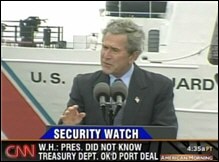 The White House says that the President didn't know about the Dubai Ports takeover deal until after it was approved.
The White House says that the President didn't know about the Dubai Ports takeover deal until after it was approved.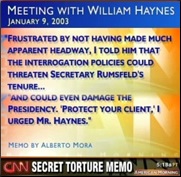 A recently revealed secret memo from general counsel of the U.S. Navy warned the Bush Administration to halt the "disastrous and unlawful policy of authorizing cruelty toward terror suspects."
A recently revealed secret memo from general counsel of the U.S. Navy warned the Bush Administration to halt the "disastrous and unlawful policy of authorizing cruelty toward terror suspects."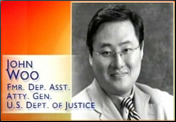 The New Yorker exposes the secret document (
The New Yorker exposes the secret document ( Homeland Security Secretary Chertoff repeated the Katrina talking points on at least three networks yesterday. Maybe he forgot his talking points to deflect questions about a decision by the Bush Administration which will allow a company located in an Arab country to takeover six of the largest ports in the U.S.
Homeland Security Secretary Chertoff repeated the Katrina talking points on at least three networks yesterday. Maybe he forgot his talking points to deflect questions about a decision by the Bush Administration which will allow a company located in an Arab country to takeover six of the largest ports in the U.S.